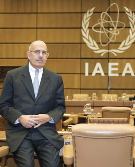ElBaradei calls for more cooperation from Syria, Iran
 Vienna - International Atomic Energy Agency (IAEA) chief Mohamed ElBaradei called on Syria Thursday to allow further inspections of the country's alleged nuclear programme.
Vienna - International Atomic Energy Agency (IAEA) chief Mohamed ElBaradei called on Syria Thursday to allow further inspections of the country's alleged nuclear programme.
In his statement before the IAEA board of governors, ElBaradei also urged Iran to clarify open questions on past studies that were possibly related to the development of nuclear weapons.
The US representative at the IAEA, Gregory Schulte, said scenarios in which Iran would use its uranium enrichment technology for nuclear weapons, rather than for nuclear energy, was plausible, given the country's lack of cooperation with the Vienna-based agency.
Last week, Syria's top nuclear official Ibrahim Othman indicated further visits to the alleged reactor site at al-Kibar, which was bombed by Israel last year, were unlikely, and that other sites could not be shown to IAEA inspectors as they were military installations.
Asking for "maximum transparency" from Syria, ElBaradei said his agency was capable of developing modalities to protect military secrets, while letting his inspectors carry out their work.
But the IAEA chief also said it was "regrettable, and indeed baffling" that his agency had not been able to buy any commercial satellite images of al-Kibar taken by after the attack in September 2007, but before the site was landscaped by Syria soon afterwards.
A diplomat said that while one member state had provided low-resolution imagery, the pictures taken by private companies would have shown more details. One or more governments might have bought up images taken by companies in eight countries, the diplomat suggested.
IAEA inspectors first visited al-Kibar in June, after having received intelligence information from the US indicating Syria was in the process of secretly building a reactor, possibly with North Korean help.
ElBaradei reiterated Thursday that "while it cannot be excluded that the building in question was intended for non-nuclear use, the features of the building ... are similar to what may be found in connection with a reactor site."
Syria has stated that al-Kibar was a conventional military site and that uranium particles found there by IAEA inspectors must have originated from munitions used by the Israeli air force to destroy the installation.
The head of the IAEA also called on Israel to provide information in order to verify Syria's claim.
Regarding Iran, ElBaradei said the country's leaders should clarify to what extent the documents on alleged nuclear weapons work which the IAEA received from member states were correct.
The IAEA has not been able to make progress on this issue since March.
Iran has stated that the allegations were based on forged documents, and that some of the research projects on missiles and high explosives were not related to nuclear applications.
US ambassador Schulte said that as Iran had a history of lack of cooperation with the IAEA, member states should be worried that country might either one day kick out agency inspectors and use its enrichment facility to make fuel for a bomb, or that it might do the same at a secret facility.
According to US intelligence estimates, Iran stopped military nuclear projects in 2004, but stands ready to resume them.
Iran's defiance of Security Council resolutions calling for a suspension of enrichment had led to a deficit of confidence that "is now so deep that it is difficult to fathom," Schulte said.
In a joint statement, Britain, France and Germany said Iran's nuclear programme had made only "negative and dangerous progress," because its continuation "continues and intensifies a threat to the stability of a troubled region."
Together with the US, Russia and China, the three European countries have offered to talk with Iran about improving business and political ties if the country halts enrichment.
Iran's ambassador Ali Asghar Soltanieh told reporters that his government was open to such negotiations, albeit without preconditions.
But he also said his country "shall never give up its inalienable right for research and peaceful uses of nuclear energy." (dpa)